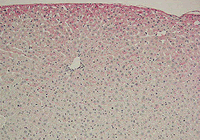anti-Dibromo-tyrosine [DiBrY], mAb (3A5)
Product Code:
JAI-MBY-020P
JAI-MBY-020P
Antibody Isotype:
Mouse IgG1kappa
Mouse IgG1kappa
Antibody Clonality:
Monoclonal
Monoclonal
Antibody Clone:
3A5
3A5
Regulatory Status:
RUO
RUO
Target Species:
Human
Human
Applications:
- Enzyme-Linked Immunosorbent Assay (ELISA)
- Immunohistochemistry (IHC)
- Western Blot (WB)
Shipping:
BLUE ICE
BLUE ICE
Storage:
-20°C
-20°C
No additional charges, what you see is what you pay! *
| Code | Size | Price |
|---|
| JAI-MBY-020P-20ug | 20 ug | £234.00 |
Quantity:
Prices exclude any Taxes / VAT
Stay in control of your spending. These prices have no additional charges to UK mainland customers, not even shipping!
* Rare exceptions are clearly labelled (only 0.14% of items!).
* Rare exceptions are clearly labelled (only 0.14% of items!).
Multibuy discounts available! Contact us to find what you can save.
This product comes from: Switzerland.
Typical lead time: 10-14 working days.
Contact us for more accurate information.
Typical lead time: 10-14 working days.
Contact us for more accurate information.
- Further Information
- Documents
- References
- Related Products
- Show All
Further Information
EClass:
32160000
Form (Short):
liquid
Formulation:
Lyophilized. Contains 10mM Phosphate buffered saline (pH7.4).
Handling Advice:
Avoid freeze/thaw cycles.
Immunogen:
Brominated keyhole limpet hemocyanin.
Long Description:
Monoclonal Antibody. Recognizes dibromotyrosine (DiBrY), N-acetylated dichloro tyrosine (NAcDiClY), diiodo tyrosine (DiIY), N-bromosuccinimide-treated BSA, HOCl-treated BSA and dibromo-tyrosone conjugated BSA (halogene-modified tyrosine at both 3- and 5-position). Does not cross-react with dityrosine-conjugated BSA, peroxynitrite-treated BSA, tyrosine (Y), chrolotyrosine(ClY), 3-3'-dityrosine (DiY), 3-aminotyrosine (NH2Y), 3-nitrotyrosine (NO2Y), phenylalanine (Phe), o-phosphotyrosine, 3,4-dihydroxyphenylacetic acid (DOPA) and 2-hydroxy-4-phenylacetic acid. Weakly cross-reacts with Bromotyrosine (BrY). Lyophilized. Contains 10mM PBS (pH7.4). Neutrophils and eosinophils play an important role in the defence system against microbial infection. Myeloperoxidase (MPO) and eosinophil peroxidase (EPO) are known to catalyze formation of hypochlorous acid (HOCl) and hypobromous acid (HOBr). These reactive intermediates may react with proteins, lipids and nucleotides, and it has been reported to form tyrosine halogenation such as dibromotyrosine (DiBrY). DiBrY is a Br-modified tyrosine at 3- and 5- position, which is one of the major oxidative products derived from neutrophil myeloperoxidase. DiBrY may be a novel biomarker for tissue damage which is related to inflammatory and allergic disorders.
Package Type:
Plastic Vial
Product Description:
Neutrophils and eosinophils play an important role in the defence system against microbial infection. Myeloperoxidase (MPO) and eosinophil peroxidase (EPO) are known to catalyze formation of hypochlorous acid (HOCl) and hypobromous acid (HOBr). These reactive intermediates may react with proteins, lipids and nucleotides, and it has been reported to form tyrosine halogenation such as dibromotyrosine (DiBrY). DiBrY is a Br-modified tyrosine at 3- and 5- position, which is one of the major oxidative products derived from neutrophil myeloperoxidase. DiBrY may be a novel biomarker for tissue damage which is related to inflammatory and allergic disorders.
Specificity:
Recognizes dibromotyrosine (DiBrY), N-acetylated dichloro tyrosine (NAcDiClY), diiodo tyrosine (DiIY), N-bromosuccinimide-treated BSA, HOCl-treated BSA and dibromo-tyrosone conjugated BSA (halogene-modified tyrosine at both 3- and 5-position). Does not cross-react with dityrosine-conjugated BSA, peroxynitrite-treated BSA, tyrosine (Y), chrolotyrosine(ClY), 3-3?-dityrosine (DiY), 3-aminotyrosine (NH2Y), 3-nitrotyrosine (NO2Y), phenylalanine (Phe), o-phosphotyrosine, 3,4-dihydroxyphenylacetic acid (DOPA) and 2-hydroxy-4-phenylacetic acid. Weakly cross-reacts with Bromotyrosine (BrY).
Transportation:
Non-hazardous
UNSPSC Category:
Primary Antibodies
UNSPSC Number:
12352203
Use & Stability:
Stable for at least 3 years after receipt when stored at -20°C.
Documents
References
Immunogenicity of a brominated protein and successive establishment of a monoclonal antibody to dihalogenated tyrosine: Y. Kato, et al.; Free Rad. Biol. Med. 38, 24 (2005)
Related Products
| Product Name | Product Code | Supplier | |||||||||||||||||||||||||||||||||||||||||||||||||||||||||||||||||||||||||||||||||||||||||||||||||
|---|---|---|---|---|---|---|---|---|---|---|---|---|---|---|---|---|---|---|---|---|---|---|---|---|---|---|---|---|---|---|---|---|---|---|---|---|---|---|---|---|---|---|---|---|---|---|---|---|---|---|---|---|---|---|---|---|---|---|---|---|---|---|---|---|---|---|---|---|---|---|---|---|---|---|---|---|---|---|---|---|---|---|---|---|---|---|---|---|---|---|---|---|---|---|---|---|---|---|---|
| anti-Acrolein [ACR], mAb (5F6) | JAI-MAR-020N | JaICA | Summary Details | ||||||||||||||||||||||||||||||||||||||||||||||||||||||||||||||||||||||||||||||||||||||||||||||||
| anti-Acrolein [ACR], mAb (5F6) | JAI-MAR-100N | JaICA | Summary Details | ||||||||||||||||||||||||||||||||||||||||||||||||||||||||||||||||||||||||||||||||||||||||||||||||
| anti-Crotonaldehyde [CRA], mAb (82D3) | JAI-MCA-030N | JaICA | Summary Details | ||||||||||||||||||||||||||||||||||||||||||||||||||||||||||||||||||||||||||||||||||||||||||||||||
| anti-Dityrosine [DT], mAb (1C3) | JAI-MDT-020P | JaICA | Summary Details | ||||||||||||||||||||||||||||||||||||||||||||||||||||||||||||||||||||||||||||||||||||||||||||||||
| anti-4-Hydroxy-2-hexenal [4-HHE], mAb (HHE53) | JAI-MHH-030N | JaICA | Summary Details | ||||||||||||||||||||||||||||||||||||||||||||||||||||||||||||||||||||||||||||||||||||||||||||||||
| anti-Hexanoyl-Lys [HEL], mAb (5F12) | JAI-MHL-021P | JaICA | Summary Details | ||||||||||||||||||||||||||||||||||||||||||||||||||||||||||||||||||||||||||||||||||||||||||||||||



